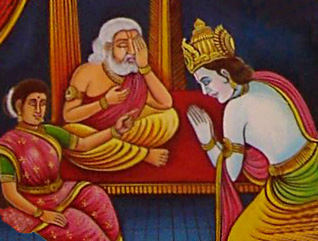जय श्रीराम!
तयोश्चतुर्दशैकेन रामं प्राव्राजयत्समाः ।
द्वितीयेन सुतस्यैच्छद्वैधव्यैकफलां श्रियम् ॥६॥
Notes: The two poisonous serpents that Kaikeyī unleashed on Daśaratha were the two boons she extracted from him. The first was that Śrī Rāma should be expelled to live in the forest as a hermit for fourteen years. The second boon was that her son, Bharata, should be conferred the throne as the Yuvarāja.
Again, we see the poetic prowess of Kālidāsa. By just one turn of phrase, वैधव्यैकफलाम्, he has summed up the suicidal impact of the boons that Kaikeyī secured. Kālidāsa says that the only upshot or outcome of the second boon, meant to confer prosperity on Bharata, was the exact converse, Kaikeyī's widowhood (=वैधव्यैकफलाम्).
No doubt Śrī Rāma was expelled to the forest. But by making the demand for the coronation of Bharata, what did Kaikeyī achieve? She seriously underestimated the nobility of her son. Not only did Bharata spurn her vile plot to place him on the throne in the place of the most deserving son, Śrī Rāma. But he also put Kaikeyī in her place by going to the forest to beg Śrī Rāma to return.
In addition, something catastrophic happened...Daśaratha died out of unfathomable sorrow at this turn of events. He died with no son by his bedside. His death plunged the kingdom into extreme distress. Also, Kaikeyī became a widow! What could be a worse fate for the queen of Ayodhyā than to become a widow, the villain everyone knew to be singularly responsible for this turn of events? Bharata lost his dear brother's leadership and his affectionate presence in the kingdom. He lost his father. He had to live for fourteen long years in the ignominy of his mother's dastardly act bringing ruin to the kingdom. And Kaikeyī suffered a fate that no woman would ever want, i.e. seeing her husband succumb to the sorrow she thrust upon him. Daśaratha's most noble life ended in the most ignoble way.
***
जय श्रीराम!










.jpg)

